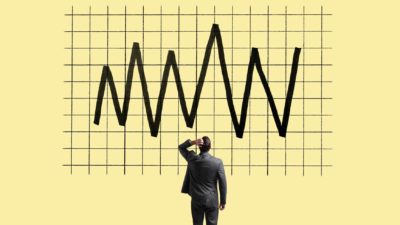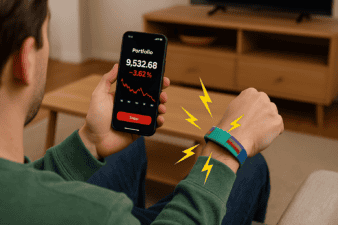I've been doing this for a few years now.
No, not writing this article (it's not that long. Promise!).
Investing.
The exact year I started is lost to history, but it's at least 25 years.
And I've been doing it for a living for more than a decade.
What have I learned?
A lot, thankfully, and hopefully I'm paying it forward a little with these regular musings.
But perhaps the most powerful thing I've learned is this: perspective.
'Experience' can sometimes feel like a pretty crappy trade-off for having less hair, more weight, fewer years left and more responsibilities… but it's something!
Actually, I kid.
I've had an extraordinarily fortunate life. I have wonderful family and friends. We live in the best country on Earth, and I've been able to do a job I love.
I wouldn't trade it for the world.
But the 'experience' thing is real.
And, in mine, at least, one of the great things about getting older is that it lengthens your time horizons.
When you're 12, you don't know how much there is to know.
By the time you're 18, you know everything, and can't believe everyone else is so dumb.
Then, by 30, you start to realise how arrogant you were at 18.
By 40?
You realise how arrogant you still were at 30.
Or is that just me?
No, I don't mean arrogant as in 'blustering' or 'oafish'.
Just that I thought I kinda had the world and life figured out.
I didn't realise how much I still had to learn.
About life.
About people.
And about the way the world works.
(Thanks for coming to my therapy session. Now, let's get back to investing.)
One of the great finance writers, Morgan Housel, posted this on Twitter, earlier this year:
"All past declines look like an opportunity, all future declines look like a risk."
To which I'd add: all current declines seem as scary as hell.
But that's where experience comes in.
See, the Asian Currency Crisis (you don't even remember that one, do you?) in 1997 felt like a huge risk.
The dot.com crash seemed like a huge bust (and it was… for a while).
The 2001 terrorist attacks in the US shook our foundations.
The GFC threatened to bring down the global financial system.
Grexit (remember that? Most don't) was going to tear Europe apart.
The COVID crash was the fastest bear market in history.
Six real or potential crises.
In just 25 years. That's more than one every five years, on average.
And they're just the big ones.
Over that time, we've also worried about China running out of foreign reserves.
And China having an economic hard landing.
The Y2K bug (remember that?).
Regional wars in the Middle East, Africa and Europe.
Property crashes have been predicted by someone almost every year.
Stock market crashes about twice as often.
And yet.
And yet, here we are.
To invoke Morgan: Every past crisis looks like an opportunity, doesn't it?
Don't you wish you'd bought (more) shares at the depth of the COVID crash?
Doesn't the GFC look like an almighty buying opportunity?
Ah, you say, but what if "This Time It's Different (™)"?
I guess it could be.
(But that's what they say every. single. time.)
It's possible that 2021 represents the peak of human endeavour and is capitalism's last hurrah.
It's possible that the future is permanently bleaker than the past.
But likely?
Nah.
And if it's not?
If the future is indeed brighter than the past?
Well, then at some future point, isn't it likely that we look back on 2022 as an opportunity?
It's hard to think like that, though, isn't it?
Because we're right in the middle of it, and it's painful and it's scary.
Which is why I'm thankful for the 'experience' I mentioned at the top.
And for the perspective it's given me.
Because, we've been here before.
Hell, I've written words like these, before.
I was writing these articles during the COVID crash, when (almost) everyone was freaking out and selling.
You know, when the crash felt like a 'risk' that we now rue as 'opportunity'.
And at other times, before and since.
I don't blame you for being worried.
It's human nature to be suffering pain, and to want it to stop.
It makes sense to avoid risk – to do anything to protect what we have.
But here's the thing.
"The thing"? Yeah, sorry. I've been hanging out with the cool kids too long.
Okay, here's my point.
Experience has given me the ability to look past the short term.
And not because I have some extra-special ability or talent.
Far from it.
But I am a reasonably good student of history.
And having lived through a chunk of it, and invested through a quarter of a century of it, I've been able to absorb some lessons.
So let's really go all-in.
Let's assume there's an Australian recession this year or next.
(The OECD is predicting one, globally, for what it's worth.)
We should sell everything, right?
I don't think so, no.
Huh?
Well, there are three outcomes:
1. There's actually no recession;
2. There's a recession, but shares bottom out before the recession itself; and/or
3. There's a recession, and share prices track the economy directly
And the problem? There's no way to know which one of those will come to pass.
But here's some things to think about:
First, the rest of the world might have a recession and we might get lucky and escape one here in Australia (as happened during the GFC).
Second, not only was the COVID crash short and sharp, but the share market recovery was swift and continued even as case numbers built and lockdowns continued.
Third, research suggests that the stock-market actually tends to be a leading indicator, when it comes to economic growth. That is, it tends to peak before the economy peaks, and tends to bottom out before the economy does. But – and this is particularly pertinent to where we find ourselves right now – it tends to recover before the economy does.
Meaning?
Meaning that by the time we know the economic news, the market has probably already recovered – perhaps significantly.
Waiting for the coast to be clear could be very, very expensive. Even more so if you sold at the bottom with plans to buy back in at some future point!
Now, there are no guarantees that any of that will happen. It's a complex system, and predictions aren't very useful.
But if history is any guide, selling and waiting for an economic recovery before buying again might be a poor strategy.
Which takes me back to perspective.
And this perspective in particular: my examples above have covered the last 25 years. We only have to go back another 5 years to use Vanguard's 30-year index chart as our touchstone.
And over the last 30 years?
Well, despite everything I've just run through, a hypothetical $10,000 investment in the ASX would have become $130,000.
And if that's not the exclamation mark I've been looking for, I don't know what is!
But it's also, I hope, the final example you need before you decide to keep pushing ahead.
Because that chart shows us the power of perspective.
Those things that feel big and scary at the time, kinda look small and inconsequential in hindsight, right?
I can't make promises or give you guarantees, but I think there's a very good chance that the chart over the next 30 years will look pretty similar: lots of reasons to worry, a few big crashes, and a lot of money made by patient investors who stay the course.
Want to talk about risk?
The biggest one, if you have a long term perspective – and I really, really think you should – might be not staying invested.
Fool on!









